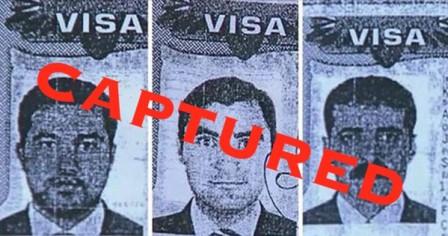I am leaving TWITTER SOON. Please continue to follow me here.
Is China Really "Opening Up" to the West?
By a remarkable coincidence, controversial international trade agreements that are opening up China to America and the European Union come exactly 100 years after a previous disastrous opening.
One hundred years ago, as now, there was talk of China opening up. Then, as now, China had been going through a period of rapid and significant change. Then, as now, her relations with the rest of the world were often traumatic.Then, as now, there was much resistance to foreign influence while other forces strove to modernize the country. Then, as now, foreign ideas were not welcome. Then, as now, Western business interests saw China, with one fifth of the world's population, as a potentially profitable market providing them with endless opportunities to make money. Then, as now, Western liberal reformers hoped for democracy in China, while missionaries hoped the country would more readily embrace their beliefs.
Perhaps this time it will be different. Perhaps. Perhaps not.
For thousands of years, the Chinese had always been a self-sufficient nation with a highly developed culture. When Europeans first arrived in the 16th century wanting to trade, the Chinese felt no great need to do business with them. Nor did they think the foreigners had anything to offer them.
The Europeans continued to push, seeing this potentially lucrative market just waiting to open up. A series of conflicts in the 19th century led to the Chinese being forced into signing trading pacts, granting the Europeans trading posts along the coast and special trading rights. These treaties humiliated the ruling Manchu dynasty that had been in power since 1644. Europeans demanded and received the right of settlement in designated areas reserved for them and were not subject to Chinese law.
A great source of grievance was the foreign missionaries to whom the treaties gave the right to reside and preach inland. These missionaries were perceived to be destroying the national way of life-the nation's social cohesion that went back thousands of years. Chinese converts stopped participating in community life and withdrew their financial support, which meant that others had to make up the difference.
Realizing its weakness in the face of Western encroachment, the Chinese embarked upon a policy of "self-strengthening," building navy yards and arsenals and their first railway. This did not prevent more loss of territory to Europeans who had recently divided the African continent between themselves and saw China as their next victim.
In 1894 and 1895 came the most humiliating defeat of all against the despised and "inferior" nation of Japan.
This war worsened the internal crisis in China. The province of Shandong was already in severe economic depression before the war. Added to this was a large influx of demobilized and defeated troops, combined with great numbers of refugees who came north to escape floods, drought and famine. To make matters worse, severe drought hit the province itself in two successive years, 1898 and 1899. Paradoxically, that first summer the Huang He River overflowed and flooded the entire Shandong Plain.
Boxer Rebellion
The central government was unable to deal with the floodwaters, a traditional sign that the dynasty was about to fall having "lost the mandate of heaven to rule." Blame was also placed on the foreigners who had upset the feng-shui , the spirits of land and water. The country was ripe for revolution and the Boxers' slogan, "Overthrow the Ch'ing (Manchu); destroy the foreigner," appealed to the masses.
The official name of their organization was "Righteous and Harmonious Fists." Westerners called them "Boxers" because of their ritualistic system of calisthenics, which aimed at full harmonization of the mind and muscles preparatory to battle. To the uninitiated, these exercises resembled boxing.
The Boxers' influence spread. After suffering a defeat at the hands of Imperial troops, the Boxers dropped their animosity to the dynasty, which by now had found common ground with the Boxers against the hated foreigners. Massacres of Chinese converts and Western missionaries began in earnest. The reason? The Western missionaries had brought in strange religious beliefs that had supposedly angered the traditional gods. European and American men, women and children were publicly beheaded as foreigners were hunted down and killed.
After killing the missionaries, Imperial troops and the Boxers turned their attention to the embassies at Beijing. The Legation Quarter was surrounded and a siege began that lasted 55 days. Because of poor communications, the rest of the world knew nothing of what was going on. When news of the siege finally did reach the Western press, it was thought that everybody was dead. For these reasons, Western nations took their time in sending military forces to Beijing to liberate their citizens.
Diplomats, businessmen, missionaries, their families and their converts were all confined to a small area of Beijing, frequently subject to hostile acts by the Boxers and the Imperial troops that besieged their compounds. They had little food and ammunition. Both had to be rationed out. The besieged were finally liberated when allied troops arrived in the middle of August.
The siege and its aftermath brought out interesting national traits that were harbingers of the century ahead. It took time for the Western nations to coordinate their efforts. As is still the case today, the Anglo-Saxons led the way. In 1900, the British were in the lead. Today, it is the Americans.
None of the nations involved had a good word to say about the French who often delayed things so that their honor and glory could be seen. (The French insisted that final victory be delayed until their forces arrived.) The Germans fueled racial tension when the kaiser talked of the "Yellow Peril." Russian soldiers turned up with no supplies and astounded everybody by being able to live off the alien land.
Everyone spoke highly of the Japanese who were the most disciplined of all the forces. They continued fighting even when the battle was won because they had lost their commander and there was no one to give them the order to quit.
The Italians were the only military force to retreat. The Americans would not accept authority, while the British naturally took command and continued to dress for dinner. The Americans insisted that the peace terms imposed upon the Chinese should be generous. Six decades later, Hollywood was to make a movie of the siege that got everything wrong!
A century of turmoil
China's decline continued. The Manchu dynasty collapsed a few years later, replaced by a fledgling republic that was wracked by internal divisions. Eventually two forces fought for domination-the pro-Western Kuomintang and the Communist Party led by Mao Zedong. Internal division enabled the Japanese to continue their aggression against the Chinese. The Japanese were to conquer a great deal of China, only withdrawing after the Allied victory over Japan in 1945.
Civil war then followed until the Communist Party triumphed in 1949. Anti-Western forces had won. Foreigners were expelled from Mainland China. Mao's Cultural Revolution (1966-69) was aimed at expunging all foreign influences from China. His followers' excesses resulted in the deaths of an estimated 25 million people-all Chinese supposedly tainted by Western customs.
Mao's Great Leap Forward was actually many strides backwards. Collectivization of farms led to severe famine and industry collapsed. His successors had to face the fact that communism wasn't working. At the same time, the party had to remain in control. Economic reforms began that allowed limited free enterprise.
Now, 20 years later, the Peoples' Republic of China is a communist country that isn't communist. Capitalism is actually encouraged while democracy is forbidden. The Chinese leadership does not want China to go the way of neighboring Russia where chaos has replaced the authority of the Communist Party. In China, the party remains firmly in control while giving the people the hope of greater prosperity.
Anti-foreign sentiment continued after Mao. In the 1990s the British and Portuguese lost control of Hong Kong and Macau. Now pressure is on Taiwan to come back under the rule of Beijing. Taiwan was lost to the Japanese in the 1895 war and is now seen as an American satellite, the last humiliation still endured by the Chinese people.
China has come a long way since the siege at Beijing a century ago. If a similar siege took place today, no Western power or combination of powers would risk sending forces into China. China has the upper hand in its dealings with the West.
Contemporary Chinese attitudes toward foreigners are best summed up in an anecdote told of former U.S. Secretary of State Henry Kissinger, the architect of America's rapprochement with China in 1972. Kissinger asked the Chinese leader what he thought of the United States. His response was, "It's too early to tell." With a continuous civilization that goes back longer than any other on earth, the Chinese do not feel that they have anything to learn from foreigners. They would certainly not be preached to by a republic that was only two centuries old. When it comes to human rights, a major concern in Washington, the Chinese react by reminding Americans that their streets and schools are a lot safer than those in the United States, so there is nothing they can learn from the U.S.
Over 2,000 years ago, the Chinese built the Great Wall to keep out foreigners and their influences. This mentality hasn't changed. Trade with the West will be permitted but strictly controlled. Looking at the historical record, any perceived threat to the authority of the Chinese government and the Chinese way of life will be dealt with swiftly and severely. "Opening up" will only go so far.
Unless, of course, the ruling Communist Party cannot save the people when the Huang He River next overflows and is perceived to have "lost the mandate of heaven to rule."
Tidings from the east
Interestingly, the Bible shows us that at the time of the end, before the return of Jesus Christ, the world will be dominated by a commercial, political and military union of 10 kings that combine power with the beast and rule for a short period. Daniel:11:44But tidings out of the east and out of the north shall trouble him: therefore he shall go forth with great fury to destroy, and utterly to make away many. shows that the power occupying the Middle East will be troubled by news from the east and the north and will attack these threats.
In the final scenario, an army of 200 million will come from the east, beyond the Euphrates, to fight against this aggressive power that will seek to conquer the earth (Revelation:9:13-16 [13] And the sixth angel sounded, and I heard a voice from the four horns of the golden altar which is before God,
[14] Saying to the sixth angel which had the trumpet, Loose the four angels which are bound in the great river Euphrates.
[15] And the four angels were loosed, which were prepared for an hour, and a day, and a month, and a year, for to slay the third part of men.
[16] And the number of the army of the horsemen were two hundred thousand thousand: and I heard the number of them.). With the sounding of the sixth trumpet, a full-scale international conflagration will erupt. Against this background, all the other events of the time of the end unfold.
China is a vast Asian power with the resources that could fulfill these prophetic visions. Its land stretches from the shores of the Pacific to the borders of Pakistan, and from the deserts of Asia to the Tibetan Himalayas. Its population of 1.2 billion, a rapidly changing and growing economy, and immense natural resources make it a rising challenger on the world stage. Regional leaders have not ignored the emerging importance of China and other Asian nations. Last fall, a start toward greater pan-Asian cooperation was made during a summit of leaders in Manila. Here is how the South China Post reported it:
"Leaders of North and Southeast Asian nations have signed a historic pact to strengthen bonds through closer economic and monetary cooperation.
"The mainland, Japan and South Korea joined the 10 members of the Association of Southeast Asian Nations in the first step towards the eventual creation of a giant East Asian common market, an economic powerhouse encompassing two billion people.
"Philippine President Joseph Estrada, who chaired yesterday's informal summit in Manila, said: 'If we persevere and work harder, maybe, the promise we fulfill will realize an even loftier dream.
"'An East Asian common market. One East Asian currency. And one East Asian community-a family from the happy union of north and south'" ( South China Post, November 29, 1999, Internet edition).
Last December the Stratfor news agency made a decade forecast about Asia based on the premise of strong protectionist measures from the United States.
"It is vital to understand, of course, that a round of protectionist measures by the United States late in the decade will have profound effects on the international system. Most important, as the United States disengages from the Eastern Hemisphere, powerful hegemonistic forces will emerge in Eurasia that will tend to destabilize the international system as a whole. That will leave a politically resentful, militarily powerful America, suffering from serious but far from catastrophic economic dysfunction, facing an increasingly unstable world.
"It is therefore our view…that economic destabilization in the United States will contribute greatly to a massive rise in international tension late in the decade. Several great powers will arise throughout Eurasia, challenging American primacy. The competition among those powers and between them and the United States will be intense, complex and dangerous. It will lack the elegant simplicity of the Cold War, posing instead the mind-numbing complexity of the pre-World War I period" (Decade Forecast, December 1999).
China is a nuclear power with large technical and intellectual resources. Matched to this is the desire to become a true superpower in today's world. Historically, its leaders have shown little concern with what other nations think of its actions and policies. As 21st century trading policies open new inroads to China, will we see a new, kinder, gentler China emerge?
Perhaps. Perhaps not. WNP
Nobody has commented yet. Be the first to kick off the discussion!








